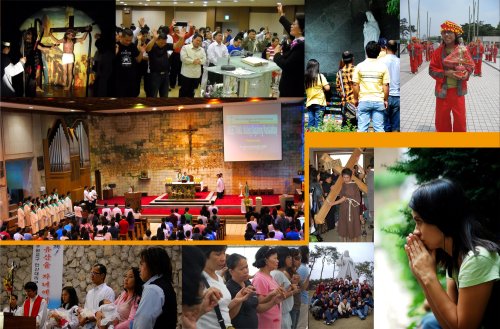What started off as a simple writing contest to bring a community closer together has grown into a book that gives an insight into an important foreign community, its people and how they relate to Korea.
The Philippine Embassy led a simple ceremony near the Filipino Sunday market in Hyehwa-dong recently to launch the book “Finding Jose Rizal in South Korea: Reflections by Filipino Migrants.”
The book is a compilation of selected essays written by overseas Filipinos as they grappled with the subjects of heroism and contemporary migration.
The essays were part of a similarly-themed writing competition conducted by the Philippine Embassy from February to March 2010.
Philippine Ambassador Luis T. Cruz explained that the project was an attempt to introduce an alternative cultural activity for Filipinos in Korea.
 |
Collage of pictures in the book “Finding Jose Rizal in South Korea: Reflections by Filipino Migrants.” (Philippines Embassy) |
“This book not only reaffirms the inherent talent of our overseas Filipinos but also allows them to express, in a creative form, their aspirations and the difficult decisions they had to make in order to assist their families back home,” he said.
Included in the book are pictures taken by members of the Filipino community for a related photography contest held from July to August.
The contest aimed to document the lives of some 50,000 Filipinos who now live in Korea as workers, students, educators, missionaries and spouses of Korean nationals.
Former President Fidel V. Ramos, a veteran of the Korean War, also contributed an essay.
In his work, Ramos traces the history of Filipinos in South Korea from the 1950s ― when the Philippines sent combat troops to South Korea ― up to the present time when Filipino migrants have become a significant societal force in the country.
“Filipinos had witnessed, from the start, the dramatic rise of South Korea from a war-ravaged country to one of the world’s largest economies,” he wrote.
Meanwhile, Ambeth Ocampo, chairman of the National Historical Commission, noted the similarities between Rizal and today’s overseas Filipino workers in his foreword.
“Rizal suffered terrible homesickness just like the modern OFW. He was an epitome of OFW adventures and misadventures and mirrored the vibrancy of the cultures he met as he crisscrossed the globe,” Ocampo wrote.
“Filipinos should strive for, as did Rizal, real national economic reforms,” he emphasized.
The 50-page book is free of charge and can be picked up at the Philippine Embassy in Itaewon-1dong or by contacting the embassy at (02) 796-7387.
The book was the brainchild of Cruz, who had the idea for it almost three years ago before coming to head the mission in Seoul.
Currently the book is being distributed to local Filipino communities nationwide and multicultural organizations.
Rizal (1861-1896), was a Filipino polymath, patriot and the most prominent advocate for reforms in the Philippines during the Spanish colonial era.
He is considered a national hero of the Philippines, and the anniversary of Rizal’s death is commemorated as a Philippine holiday called Rizal Day.
Rizal’s 1896 military trial and execution made him a martyr of the Philippine Revolution.
By Yoav Cerralbo (
yoav@heraldcorp.com)








